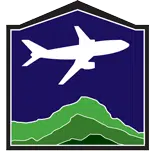Accessibility
Frequently Asked Questions
The Airport Terminal is open 24 hours daily.
Office Hours: Monday - Friday, 8:30 AM - 4:30 PM
Firearms
You may transport unloaded firearms in a locked hard-sided container as checked baggage only. Declare the firearm and/or ammunition to the airline when checking your bag at the ticket counter. The container must completely secure the firearm from being accessed. Locked cases that can be easily opened are not permitted. Be aware that the container the firearm was in when purchased may not adequately secure the firearm when it is transported in checked baggage.
- When traveling, comply with the laws concerning possession of firearms as they vary by local, state and international governments.
- If you are traveling internationally with a firearm in checked baggage, please check the U.S. Customs and Border Protection website for information and requirements prior to travel.
- Declare each firearm each time you present it for transport as checked baggage. Ask your airline about limitations or fees that may apply.
- Firearms must be unloaded and locked in a hard-sided container and transported as checked baggage only. As defined by 49 CFR 1540.5 a loaded firearm has a live round of ammunition, or any component thereof, in the chamber or cylinder or in a magazine inserted in the firearm. For civil enforcement purposes, TSA also considers a firearm to be loaded when both the firearm and ammunition are accessible to the passenger. For example, if an individual has a firearm in accessible baggage and ammunition in his/her pocket, or any combination where the individual has access to both, the firearm is considered "loaded" for purposes of assessing a civil penalty. Only the passenger should retain the key or combination to the lock unless TSA personnel request the key to open the firearm container to ensure compliance with TSA regulations. You may use any brand or type of lock to secure your firearm case, including TSA-recognized locks.
- Bringing an unloaded firearm with accessible ammunition to the security checkpoint carries the same civil penalty/fine as bringing a loaded firearm to the checkpoint.
- Firearm parts, including magazines, clips, bolts and firing pins, are prohibited in carry-on baggage, but may be transported in checked baggage.
- Replica firearms, including firearm replicas that are toys, may be transported in checked baggage only.
- Rifle scopes are permitted in carry-on and checked baggage.
Identification requirements
Identification Requirements
The Transportation Security Administration requires adult passengers to present an acceptable government-issued photo ID at the security checkpoint. Acceptable forms of identification include a REAL ID-compliant state driver’s license or identification card, a U.S. passport, or a photo ID issued by a federally recognized Tribal Nation.
A complete list of acceptable forms of identification can be found at https://www.tsa.gov/travel/security-screening/identification
Information regarding REALID can be found at https://www.tsa.gov/real-id
Forgot Your Identification?
Beginning February 1, 2026, travelers who arrive at the checkpoint without an acceptable form of identification must use TSA’s ConfirmID process to fly.
TSA ConfirmID is an identity verification option that requires travelers to pay a $45 fee online before travel and present a printed or digital receipt to the TSA officer at the checkpoint. This process cannot be completed by airport staff.
Learn about TSA ConfirmID at https://www.tsa.gov/tsaconfirm-id
Minor Identification
The Transportation Security Administration does not require children under the age of 18 to present identification when traveling within the United States with a companion.
The accompanying adult must present acceptable identification at the checkpoint.
Local phone numbers for the airlines?
There are no local phone numbers for airlines and they do not take calls here. Please contact airlines through their official websites.
Lost Items
Contact your airline directly for items left on an aircraft and lost luggage. Airlines do not have a local number for lost and found inquiries.
If your item was lost in the terminal, complete the form at: https://rapairport.com/lostandfound/
Lost Luggage
Contact your airline directly for items left on an aircraft and lost luggage.
Airlines do not have a local number for lost and found inquiries. Only the airline (not the airport) can assist with baggage.
Luggage and Key Storage
Rapid City Regional Airport does not offer storage for luggage or keys.
Mobile boarding
Rapid City Regional Airport features modern day mobile boarding pass technology. Passengers may access their boarding passes using any mobile device via free public WIFI.
Portable oxygen
The only oxygen equipment allowed on an airplane is the portable oxygen concentrator (POC). If you need oxygen in flight, you must take a portable oxygen concentrator with you, and , you must let your airline know ahead of time.
General Tips:
- Start making arrangements with the airline well ahead of time to find out which POC is allowed. Many airlines list accepted manufacturers and brands on their websites.
- Allow plenty of extra time for check-in.
- Carry several extra battery packs. FAA regulations require enough battery time to cover 150 percent of the flight time.
- Carry an extra three-way plug for recharging your POC in the airport. People often need to recharge their electronic equipment in the airport during layovers, and this will help assure that you will be able to recharge yours.
- POCs are exempt from the carry-on count.
- Carry a prescription or letter regarding your need for oxygen, signed by your doctor.
Prohibited Items
Planning ahead and packing properly can facilitate the TSA screening process.
Medications in carry-on bags
Medications in pill or other solid form must undergo security screening. It is recommended that medication be clearly labeled to facilitate the screening process.
Check with state laws regarding prescription medication labels. You are responsible for displaying, handling, and repacking the medication when screening is required. Medication can undergo a visual or x-ray screening and may be tested for traces of explosives.
Screening
The TSA uses walk-through imaging technology and metal detectors to screen passengers for both metallic and non-metallic threats like weapons and explosives. Passengers can usually ask to forgo an imaging screening in favor of a physical screening, but this may not always be the case depending on numerous factors. Ultimately, policies and procedures are decided by the TSA and its agents at the airport.
Pat-Down Screening
Pat-down procedures are used to determine whether passengers are attempting to conceal prohibited items and is generally used only if the screening technology is set off. However, this is not always the case and pat-down procedures may be used for a number of reasons.
Pat-downs will be performed by an officer of the same gender, who will thoroughly explain the process while executing the steps necessary to determine no threat items are detected.
Checked Baggage Screening
During check-in, your checked baggage will be provided to TSA agents for security screening. Once the screening process is finished, your airline will be responsible for transporting your luggage to your plane, then to the baggage claim area. Most checked bag screenings are completed without the need to open your luggage.
Please visit the TSA website for a list of what is allowed.
Ticket Pricing and Refunds
Ticket prices vary based on airline, destination, and travel dates. The airport has no control over prices.
Refunds and changes to reservations can only be processed by contacting the airlines' customer support.
American Airlines: 800-433-7300
Allegiant Airlines: 1 (702) 505-8888
Delta Air Lines: 1 (800) 221-1212
United Airlines: 1 (800) 864-8331
Sun Country Airlines: 651-905-2737
Airlines do not have a local desk number for sales or refunds.
Travel health notices
Masks are no longer required at Rapid City Regional Airport.
Proof of vaccination is not currently required for domestic travel to Rapid City Regional Airport. There are currently no quarantine requirements in South Dakota for inbound travelers. International travel restrictions vary by destination.
We encourage all airport users to practice personal responsibility and social distancing while visiting the Rapid City Regional Airport (RAP).
TSA Precheck
Rapid City Regional Airport has a designated lane for TSA Precheck. Children 17 and under can join an adult with TSA PreCheck® when TSA PreCheck appears on the child’s boarding pass.
Rapid City Regional Airport does not have an on-site TSA pre-check enrollment center.
Enrollment Centers:
Idemia Rapid City SD-E Catron Blvd (Idemia)
1301 E Catron Blvd
Rapid City, SD 57701
United States
12.72 miles from airport
Idemia Rapid City SD-Lindbergh Ave (Idemia)
611 Lindbergh Ave
Rapid City, SD 57701
United States
12.72 miles from airport
What time do I need to arrive at the airport?
Arrive at least 2 hours prior to scheduled flight departure time for domestic flights.
This allows time for parking and shuttle transportation, airline check-in, obtaining a boarding pass and the security screening process.
If you are an unaccompanied minor, traveling with pets or require other special accommodations, allow additional time for special check-in procedures.
Ticket counters open 2 hours before departure.
Ticket counters close 45 minutes prior to flight departure.
Rapid City Regional Airport is committed to fully abiding by Airline Consumers’ Rights.
City of Rapid City Incident Claim Form





